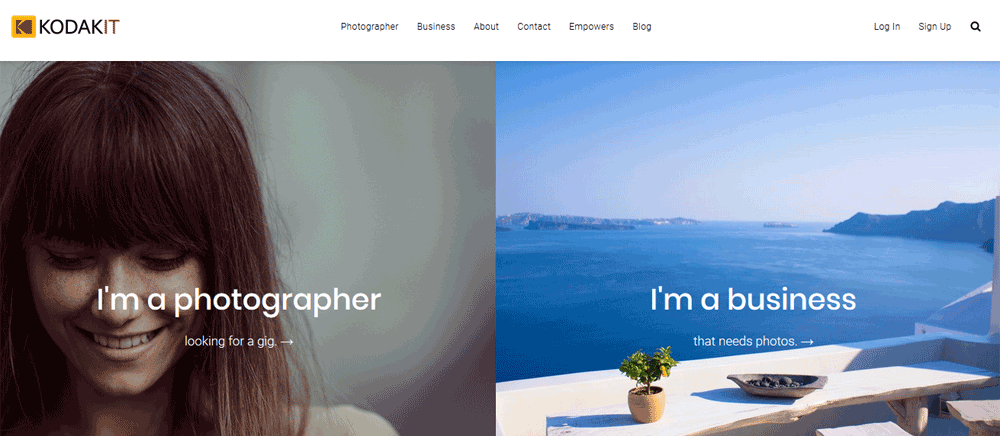Kodakit, a controversial, low-rent, online photography service, is requiring contracted photographers to waive all copyright and moral rights for all images they capture.
 Kodakit, announced in early 2016, is a Singaporean-based subsidiary of the once-legendary Eastman Kodak.
Kodakit, announced in early 2016, is a Singaporean-based subsidiary of the once-legendary Eastman Kodak.
The online app links clients with a global network of contracted photographers, and has apparently worked with three to four thousand photographers across Australia, Asia, USA, and Europe. Clients include successful businesses like Uber Eats, Expedia, and Amazon – according to Kodakit.
The sales pitch is that ‘photo shoots used to be complicated – we’ve fixed that’, as if hiring a photographer was a problem that needed a solution.
The professional photo industry hasn’t taken kindly to Kodakit, which has obviously entered the race to ‘Uberise’ professional photography like several other start-up companies.
The primary concern is Kodakit devalues and endangers professional photographers. Enthusiast photographers are encouraged to sign up, are provided with basic guidance on client expectations, and away they go. French photographer, Benoit Florençon, summed things up nicely here.
Photo trade news website, PDN, recently warned photographers about the rights-grabbing Photographer Terms and Conditions that have been in effect since July 2018.
Photographers provide the entire copyright to the client, ‘perpetually and irrevocably’, and ‘all rights, title and interest’. Outtakes must be given to the client or destroyed.
No images can be used for personal promotion without written permission from Kodakit or the client.
All moral rights are withdrawn, meaning the photographer cannot object or prevent ‘modification or destruction of a work, to withdraw from circulation or control the publication or distribution of a work’.
Kodakit also appears to be aware of the risks associated with hiring amateur practitioners, and is distancing itself from any mishaps: Photographers are signed up as ‘independent contractors’, meaning they have no employment benefits such as legal protection. Kodakit says all jobs are performed at the photographer’s risk – it doesn’t sound like there’s much in the way of insurance coverage.
Should a legal claim arise, the photographer assumes all costs and risks while Kodakit is protected. Clients may also refuse to pay if they reject a photographer’s work. PDN lastly says that any disputes between the photographer and client ‘must taken to an arbitrator or court of law in Singapore’.
Mickey Osterreicher, general counsel of the US National Press Photographers Association (NPPA), says this is a bad contract for photographers.
‘I can’t image who at Kodak thought this to be a good idea, but…it is extremely disappointing that a company whose name was once synonymous with photography would promote a program that strips photographers of copyright and so unilaterally favors the client that it resembles a contract of adhesion,’ he said to PDN.
Osterreicher, through the NPPA, is vocal about unfair photography contracts. He convinced management for pop star Taylor Swift to amend a strict photo contract in 2015, and campaigned against magazine publisher Conde Nast’s right-grabbing contract.
Kodakit chief marketing officer, Natasha Adams, told PDN that the contract is written to manage copyright across a global market with a high volume of clients.
She says that not all photographers agree to the contract, but those who do are ‘taking constant gigs’, and are a very happy bunch of Vegemites indeed.





Be First to Comment